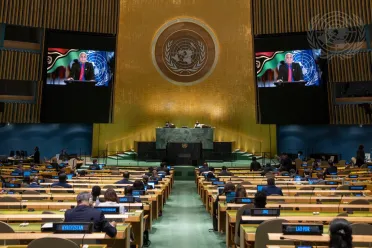Statement
Statement summary
BOB LOUGHMAN WEIBUR, Prime Minister of Vanuatu, stated that disease and despair have characterized the past two years, with inequality and instability growing across the globe. The international community must adapt to the “new normal” and work together. The pandemic has set back achievements of the 2030 Agenda and Sustainable Development Goals. Evidence of climate change effects have been increasing, including record-breaking wildfires, flooding and more extreme temperatures. Rapid reductions in greenhouse‑gas emissions are urgently needed to limit warming to near 1.5°C. For small island developing States, climate change is one of the biggest threats, alongside the management of oceans and COVID-19. To recover “better together” the international community must act at the global and national levels while building inclusive economies and resilient societies.
In all countries, the economic shock caused by the pandemic has exposed structural weaknesses, notably in health and social‑protection systems, he continued. For Vanuatu, the pandemic was followed by the Category 5 Tropical Cyclone Harold, which caused extensive devastation in April 2020. Navigating recovery will be challenging if the pandemic is not contained soon. Although, Vanuatu managed to escape transmission of COVID-19, the lockdown on international borders crippled its economy. About 10 per cent of the eligible population has been vaccinated in Vanuatu and the Government has educated the citizens on the benefits of vaccines and is mobilizing mass vaccination. “Vaccine access remains the most critical issue for the global recovery,” he stressed.
Vanuatu has taken a bold step to graduate out of the least developed countries category in 2020, he continued. To that end, he highlighted the need for United Nations agencies to improve monitoring mechanisms for graduating and graduated countries. The Economic and Social Commission for Asia and the Pacific (ESCAP) must continue support for graduating least developed countries in preparing strategies for smooth transitions and scaling up its technical assistance to graduated countries in implementing and monitoring those strategies.
New Caledonia, French Polynesia and West Papua are still struggling for self-determination, he pointed out, drawing attention to the principle of “equal rights and self-determination of peoples”, as mentioned in the United Nations Charter. He expressed his hope that the United Nations-led process draws a clear pathway towards achieving a peaceful settlement of these disputed islands. Highlighting that the indigenous people of West Papua continue to suffer from human rights violations, he called on the Indonesian Government to allow the Office of the United Nations High Commissioner for Human Rights (OHCHR) to visit the West Papua province and provide an independent assessment of the human rights situation.
Full statement
Read the full statement, in PDF format.
Photo

Previous sessions
Access the statements from previous sessions.
